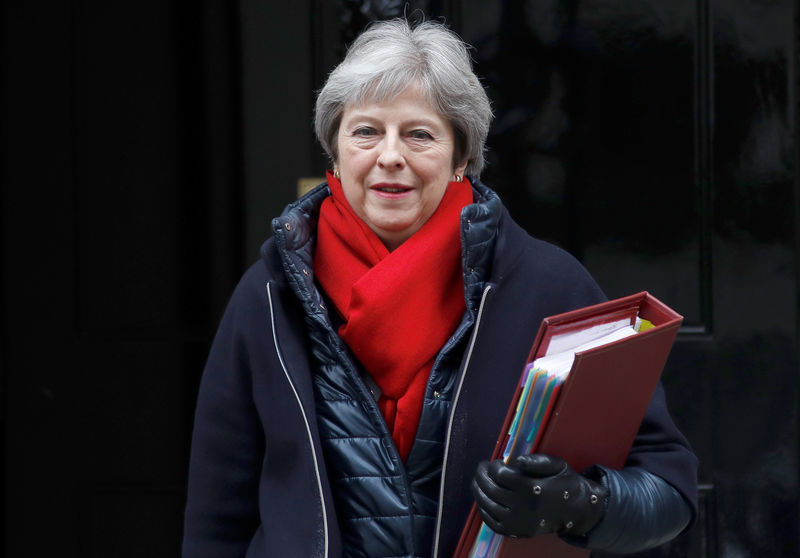 © Reuters. Britain’s Prime Minister Theresa May leaves 10 Downing Street in London
© Reuters. Britain’s Prime Minister Theresa May leaves 10 Downing Street in LondonLONDON (Reuters) – Prime Minister Theresa May has said Britain will not join a customs union with the European Union after Brexit, splitting her ruling Conservative Party and upsetting many business leaders.
Her plans delight some Brexit supporters who say staying in a customs union would stop Britain from doing trade deals with other economies around the world, one of the big advantages of leaving the EU, they argue.
Britain’s trade minister Liam Fox, a strong supporter of Brexit, said on Tuesday staying in a customs union would be “a sellout”.
But the leader of the opposition Labour Party, Jeremy Corbyn, has backed Britain forging a new customs union with the EU. He wants to join forces with rebel Conservative lawmakers to block May’s plans in a vote in parliament due in coming months.
London may also be forced to reconsider if Brussels sticks to its insistence that leaving the EU’s single market and its customs unions will mean some barriers for UK exports.
WHAT IS A CUSTOMS UNION?
The EU’s 28 member countries operate as a single market which is the world’s biggest trading bloc. The EU imposes tariffs on goods from outside the bloc. But non-EU member Turkey avoids many of them while imposing the bloc’s external import tariffs under its customs union agreement with Brussels.
WHAT IS THE UPSIDE OF BEING OUTSIDE A CUSTOMS UNION?
For many Brexit supporters, a customs union is a non-starter. It would prevent Britain from setting its own import tariffs, killing any chance of setting up its own trade deals in goods with developed countries such as Australia and New Zealand and emerging economies such as India and China.
Brexit supporters point to the fast economic growth rates in many of those countries as a golden opportunity for Britain.
They also bristle at the idea of having to follow Brussels’ lead on tariffs after Brexit. Britain’s health minister, Jeremy Hunt, said this week it would mean “we wouldn’t have full sovereign control of our destiny as a nation.”
WHAT IS THE DOWNSIDE OF BEING OUTSIDE A CUSTOMS UNION?
The EU is Britain’s biggest trade partner by a long way, accounting for 43 percent of its exports in 2016. That is down from 54 percent in 2006, but it remains more than double the share of exports that Britain sells to the United States.
While May and her ministers say they plan to negotiate the best access possible to the EU, Brussels says Britain is on course to run into trade barriers.
As well as tariffs, not being in a customs union would mean more paperwork and customs checks for British exporters which can be as costly as tariffs.
It would also raise the risk of a return to a so-called ‘hard border’ between Northern Ireland and the Republic of Ireland, which could threaten the peace process on the island.
CAN THE UK BE A BIT IN AND A BIT OUT OF A CUSTOMS UNION?
The Institute of Directors, a British employers’ group, said this month that a partial customs union could solve the impasse.
Under its plan, trade in high-tariff industrial goods and processed agricultural products would be duty-free. Rules of origin requirements would be waived for them too.
Britain would be free to strike trade deals with other countries excluding those goods, the IoD said.
So far, the government has shown no sign that it is prepared to go for a partial customs union.
WHAT ABOUT BRITAIN’S HUGE SERVICES SECTOR?
About 80 percent of Britain’s economy is in the services sector, ranging from banking and insurance in the City of London to architectural firms and education providers. Britain has a surplus in trade in services with other countries.
Service exports would not be covered by a customs union with the EU and, with or without one, Britain will be free to try to open up markets around the world for its services firms.
But progress at a global level in breaking down those barriers has been slower than for trade in goods. Governments are often reluctant to commit to opening up banking, for example, given the power of British and U.S. banks.
Source: Investing.com





























